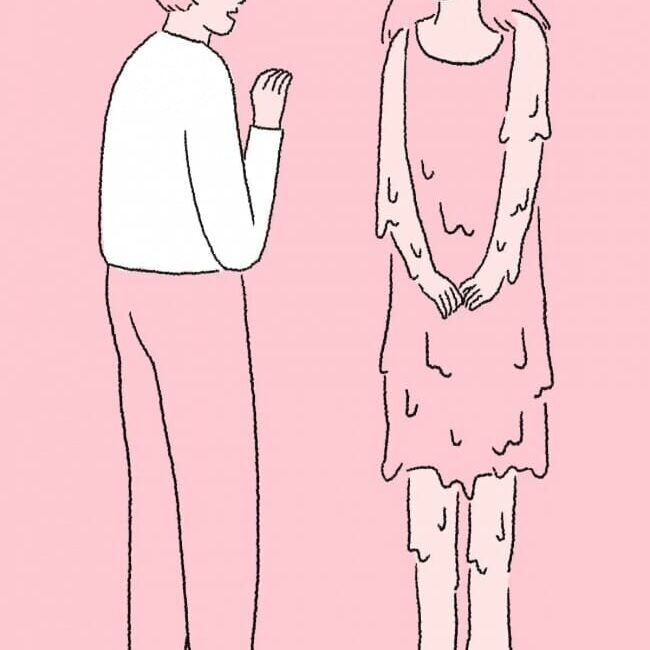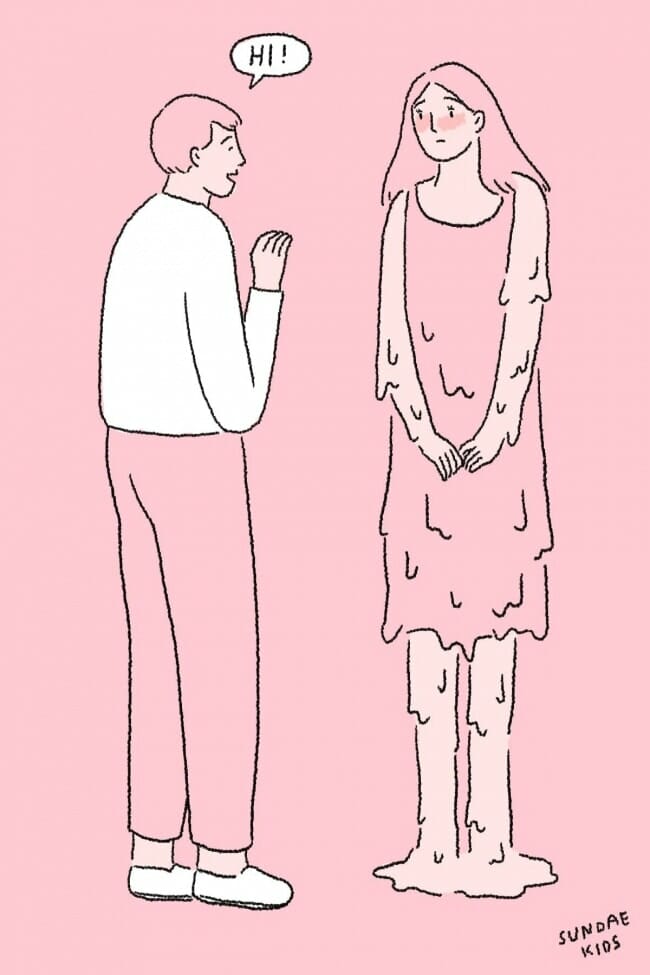
How do I live, laugh, love without being myself?
An essay on dating white men as a woman of colour
If my early teenage years were to be turned into a collage — pretty cut-outs making my coming-of-age journey into something quirky and digestible — I can imagine it would include a lot of velvet red chokers, Arctic Monkey CDs, Kylie Jenner dark lipstick, fatphobic romantic comedies, Tumblr fandoms and YA novels.
Among all these, perhaps the most pertinent, is the never-ending longing for love.
Much like enjoying white wine, learning how to drive and getting extended curfew hours at 18, experiencing love appeared to me as a rite of passage that had to happen in order to truly become an adult.

(Sundae Kids)
Observations
Prior to moving from Latin America to Canada, I always assumed my love life outside Ecuador would be made awkward by the sheer embarrassment of inexperience.
To my surprise, it was made awkward by strange questions, fetishes and microaggressions.
Dating white men as a racialized woman is as interesting as it is strange. I have met white men who have treated me as though I were an object of admiration more than an object of desire. Take these weirdly targeted statements and questions directed my way: “Spanish is such a beautiful language!”, “Can you say Barcelona for me again?” or “So, you can understand [Lionel] Messi?”
Without my consent, these questions have often felt like a grotesque transformation, much like the depiction of a drug trip in cartoons. The questions are the colourful, wacky, swirling lines and suddenly, I am no longer Natalia but rather this complex, surrealist Salvador Dali painting: meant to be analyzed, even possessed. But never touched.
Admittedly, sometimes it’s funny to play along. Sometimes.
Believe it or not, I’ve been asked if Dora the Explorer taught me Spanish. Sarcastically, I answered, “Yes obviously!” While Ecuador’s first language is Spanish, it was Dora who taught me the verbs and pronouns. In return, I only received a blank nod.
A few months later, I told this story to a different white man who seemed smarter, only to be asked if Dora taught English in Latin America.
“Yes she does,” I replied, a little confused.
“Ah, that makes sense. Otherwise, how would you know English?” he replied.
And yet, the same people will fake a laugh and shift uncomfortably in their seats when I tell them something that reflects the harsh reality of my country.
The poverty of kids selling gum and cigarettes in the street. Ecuador’s debt to China keeping the country on a tight leash. Having to stash my wallet inside my boot when I walk in the streets. Never walking in said streets after 3 p.m.
The names of the girls impregnated at 16 years old.
The names of the women who die every 26 hours in Ecuador.
Every 26 hours.
26.
Causing me to flinch at friendly strangers, cover my body with big jackets in public, keeping my friends awake when I am out on a date. Taking a picture of the license plate and sending it to my friends and my family every time I get into a car.
I want my loved ones to have all the possible clues in the world when, not if, I go missing.
Realizations
Maybe in my own way, these men are just as interesting to me as I am to them. I remember going out with an American man a couple of months ago. Maybe it was his way of assuming that everything would be open at 3 a.m. in Halifax. Maybe it was the fact that he pulled out a shiny, green $5 bill to buy something as silly as a soda.
It was his way of perceiving life like it owes him something — yet he owed it nothing. Not having to run away from scary shadows when returning from a bar, or arm yourself with fake confidence when a stranger approaches you in the streets.
And often I wonder, as women of colour, how are we expected to react? Are we meant to compartmentalize our lived experiences — hiding the difficult ones in order to be more appealing to the male gaze? Are we meant to become the world’s worst-paid ambassadors and provide explanation after explanation about our cultures and views of the world?
Am I expected to ask my dates to call me Nat and not Nati because it’s easier for tongues used to English and not Spanish?
Reflections
While there is no final answer to these questions, I firmly think they are worth contemplating. When two people with different realities meet, perhaps they look at each other not eye to eye, but through looking glasses, broken bathroom mirrors, phone cameras, side glances …
To me, the questions become: how do we breach this distance, so we can speak to each other and hear each other sincerely? How can we learn to better understand each other so we can love each other a little better?
This isn’t a piece against interracial dating. Nor a shout-out to all those people who I never saw again after they made a remark that sounded more racist than curious. Rather, this is an open invitation to think about how we can learn from each other.
Perhaps, there is something to be said about how the Latinx community approaches life and, most importantly, love. If I had to find a word to describe it, the word would be courageous. Despite all adversity, crime and death around us. Our philosophy of living passionately, sometimes taking things too seriously or not taking them seriously at all. It’s only life after all.
Celia Cruz once sang about how life is a carnival and we should never stop dancing. My grandpa says that when years pass, we will remember not the dangers or the bills, but the wine glasses clinking and the great conversations.






